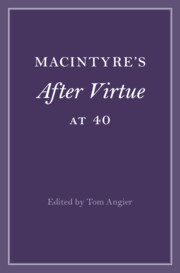Book contents
- MacIntyre’s After Virtue at 40
- Cambridge Philosophical Anniversaries
- MacIntyre’s After Virtue at 40
- Copyright page
- Contents
- Contributors
- Introduction
- Part I After Virtue and Ethical Theory
- Part II After Virtue and Political Theory
- Part III After Virtue and Narrative
- Part IV After Virtue beyond Philosophy
- 11 Theological Overtones in After Virtue
- 12 Law as Social Practice
- 13 After Virtue, Managers and Business Ethics
- Bibliography
- Index
12 - Law as Social Practice
After Virtue and Legal Theory
from Part IV - After Virtue beyond Philosophy
Published online by Cambridge University Press: 12 October 2023
- MacIntyre’s After Virtue at 40
- Cambridge Philosophical Anniversaries
- MacIntyre’s After Virtue at 40
- Copyright page
- Contents
- Contributors
- Introduction
- Part I After Virtue and Ethical Theory
- Part II After Virtue and Political Theory
- Part III After Virtue and Narrative
- Part IV After Virtue beyond Philosophy
- 11 Theological Overtones in After Virtue
- 12 Law as Social Practice
- 13 After Virtue, Managers and Business Ethics
- Bibliography
- Index
Summary
This chapter argues that there is considerable potential for contemporary legal theory to benefit from key insights and concepts in MacIntyre’s social and political theory, as laid out in After Virtue and developed in his subsequent works. In particular, the chapter advances an account of law in terms of what MacIntyre calls a ‘social practice’, drawing on his work on the relationship between reasons for action, goods and rules. The key claim is that MacIntyre-inspired legal theory can assist our insight into law as a social phenomenon, which has been a key ambition for contemporary Anglophone legal theory since H. L. A. Hart. However, not only has MacIntyre been neglected in legal theory, he has shown little interest in developing an understanding of law as a social practice. Indeed, he has expressed antipathy towards juridical modes of thought, and also lawyers, referring to them as ‘the clergy of liberalism’ in Whose Justice? Which Rationality?. Arguing for the prospects of a rapprochement, then, my chapter will both explain and challenge this mutual neglect. On the one hand, it will challenge the methodological dispositions of contemporary Anglophone legal theory, which stand against MacIntyre on the is–ought problem and the expansiveness of his enquiry. On the other hand, it will question the extremity of MacIntyre’s disposition against the practice of law within liberal societies and against the dangers of legalism for rejuvenating a communal life of virtue: not just in theory, but also in practice.
- Type
- Chapter
- Information
- MacIntyre's After Virtue at 40 , pp. 219 - 238Publisher: Cambridge University PressPrint publication year: 2023

